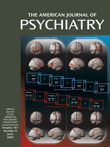Atypical Antipsychotics and Risk of Cerebrovascular Accidents
Abstract
OBJECTIVE: Randomized controlled trials have suggested that at least one atypical antipsychotic may be associated with an increased risk of stroke in older people with dementia. This study examined the association between atypical antipsychotic use and stroke in the elderly. METHOD: The authors conducted a retrospective population-based cohort study of patients over the age of 66 by linking administrative health care databases. Three cohorts—users of typical antipsychotics, risperidone, and olanzapine—were identified and compared. RESULTS: Subjects treated with typical antipsychotics (N=1,015) were compared with those given risperidone (N=6,964) and olanzapine (N=3,421). Model-based estimates adjusted for covariates hypothesized to be associated with stroke risk revealed relative risk estimates of 1.1 (95% CI=0.5–2.3) for olanzapine and 1.4 (95% CI=0.7–2.8) for risperidone. CONCLUSIONS: Olanzapine and risperidone use were not associated with a statistically significant increased risk of stroke compared with typical antipsychotic use.



